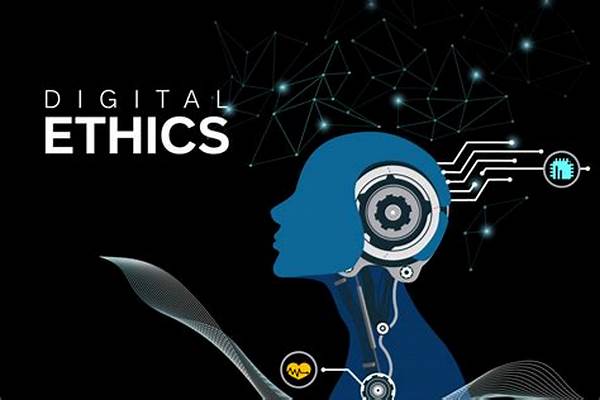Digital Ethics and Equity
In the ever-evolving landscape of the digital age, the discourse surrounding digital ethics and equity is becoming increasingly prominent. As technology advances at a breakneck pace, reshaping how we live, work, and communicate, it brings along an array of ethical dilemmas and questions of fairness. Digital ethics refers to the philosophy and study of morally acceptable behavior in the digital world, including issues like privacy concerns, data protection, and algorithmic bias. Equity, on the other hand, emphasizes fairness, ensuring that advancements in technology are accessible and beneficial for all, not just a privileged few. Both concepts are integral in navigating the complex digital terrain, where the decisions we make today can have profound implications for future generations.
The Intersection of Digital Ethics and Equity
Digital ethics and equity intersect at a crucial crossroads, where the potential for positive change is immense if guided by thoughtful, ethical practices. For businesses and individuals alike, embracing these principles is not just a moral obligation but a strategic advantage. Companies that prioritize ethical standards and equitable access are likely to build trust and loyalty with customers. Moreover, they contribute to a more inclusive society, tapping into a broader pool of talent and ideas. As we delve deeper into this digital era, the call for ethical accountability and equitable opportunities becomes more urgent, demanding action and awareness from every stakeholder involved.
At the heart of digital ethics lies the commitment to transparency and accountability. Whether it’s ensuring the responsible use of artificial intelligence or safeguarding user data, organizations must uphold these ethical standards. Equally important is the pursuit of equity in the digital space. Access to technology should not be a luxury but a right, empowering everyone from all walks of life to benefit from digital advancements.
In a world where technology determines so many aspects of our lives, fostering an environment of ethical practices and equitable access is imperative. We must challenge ourselves to question what is fair and right, advocating for a digital society that respects individuality yet promotes collective growth. This journey requires collaboration, innovation, and an unwavering dedication to ethical conduct and equitable access.
Bridging the Gap: Strategies for Digital Ethics and Equity
Now more than ever, the digital sphere demands a conscientious approach to ensure both ethical integrity and equity. To truly succeed in this endeavor, we must involve diverse voices, integrate ethical frameworks into business models, and continually educate ourselves about the impacts of our technological footprint. The future of technology should be one where digital ethics and equity are not afterthoughts but fundamental cornerstones that shape policy and practice.
—
Structuring a Fair Digital Frontier
The digital world represents a frontier of possibilities, one where digital ethics and equity play critical roles in shaping the landscape. How we navigate this terrain will have long-lasting effects on society. It’s time to examine how these concepts are integrated into modern technology and business practices, ensuring they guide, rather than hinder, innovation and access.
The Role of Organizations in Upholding Digital Ethics and Equity
Organizations are pivotal in fostering a culture that prioritizes digital ethics and equity. By ensuring transparency in their operations and democratizing access to technology, they can lead by example. Training employees on ethical standards and the importance of equitable opportunities can also help create an informed workforce ready to adapt to ethical challenges.
Subheadings provide an organizational structure that aids in delivering information effectively. In this context, using subheadings like H2 and H3 can be advantageous as they help in highlighting crucial themes and subtopics relevant to digital ethics and equity, ensuring readers can easily navigate the content.
Strategies for Promoting Equity in the Digital Age
Employing strategies that promote equity in technology requires an inclusive mindset and proactive policies. Ensuring equitable access means recognizing the digital divide and implementing measures to bridge it, such as investing in digital infrastructure in underserved communities. Companies can foster further equity by creating inclusive software that considers the diverse needs of users with different abilities.
Digital ethics and equity go hand in hand. One cannot exist without the other if we want to build an inclusive digital future. As we continue to explore this dynamic, it’s essential to understand that promoting ethical practices in technology isn’t merely an individual effort. It requires collaboration among governments, businesses, and communities worldwide.
The Stakeholder’s Role in Driving Digital Change
Stakeholders at all levels play an integral role in fostering a digital environment characterized by ethical considerations and equitable access. Governments can institute policies that mandate ethical tech use and ensure equal digital opportunities, while consumers can make choices that reflect their values concerning digital ethics and equity.
The importance of pushing for ethical standards is not only an individual concern but a societal one. As we advance further into digital realms, stakeholders must work together to ensure that digital ethics and equity are at the forefront of technological progression. This coordinated effort can empower people globally, fostering a more just and technologically advanced society.

